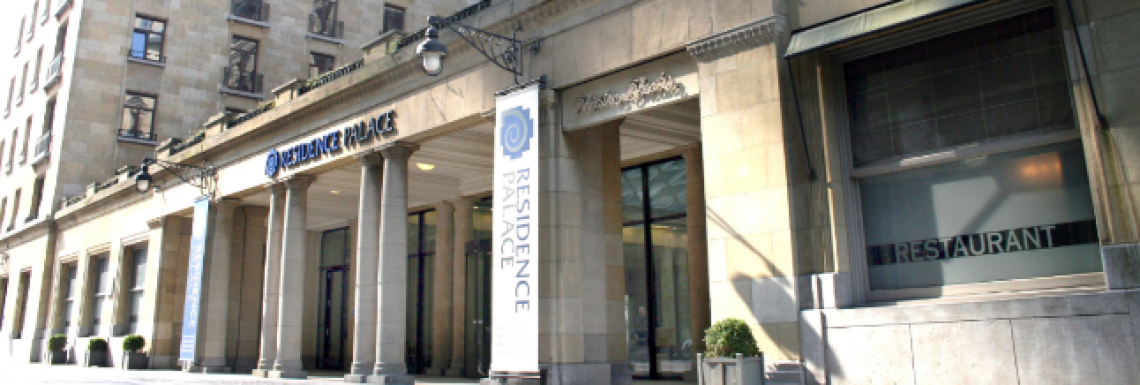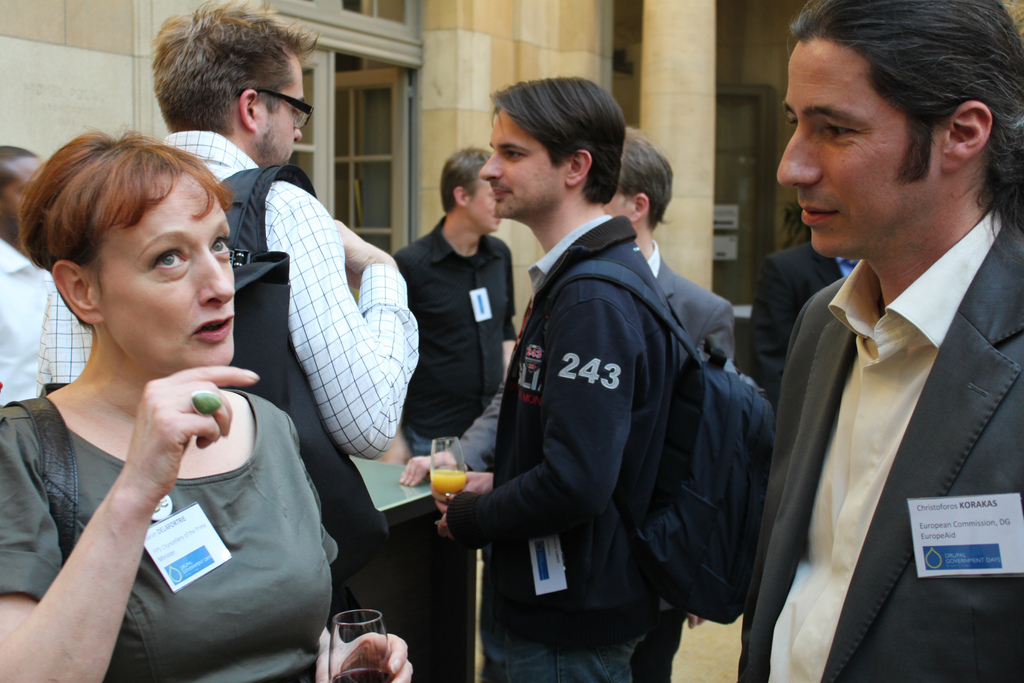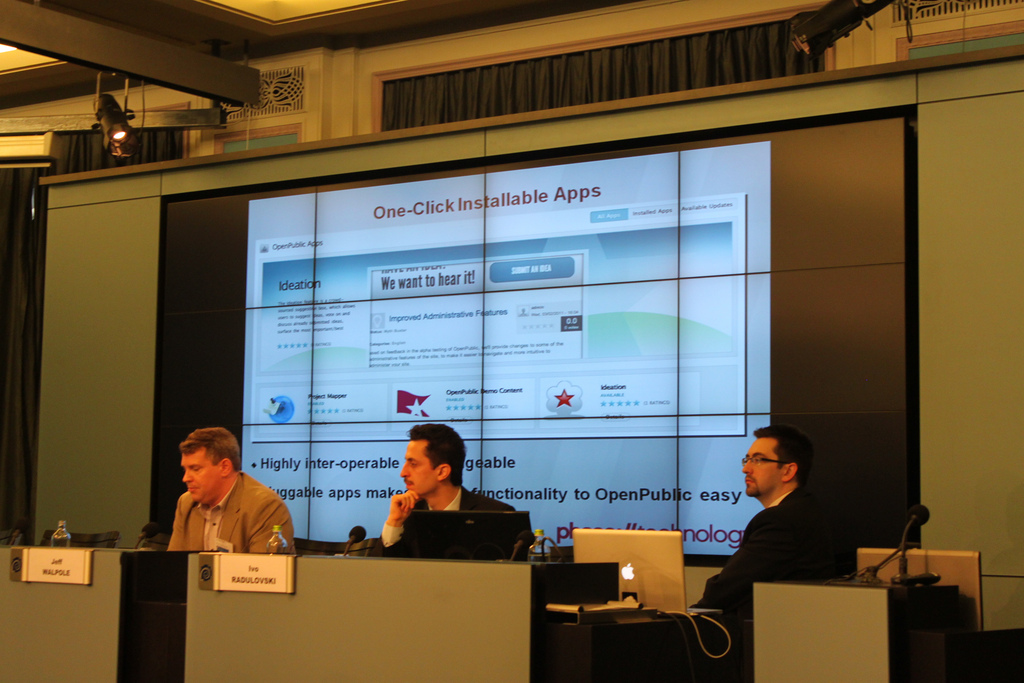
The first Drupal Government Days held in Brussels on April 7-9, 2011 can be definitely considered as a success and a starting point for future discussions and events about Drupal for governments.
With great contentment I look back to three days of lively discussions and exchange of ideas about what Drupal can do for governments and how interactions and collaboration can be improved. The beautiful Résidence Palace with its International Press Center next to the European Comission and was the setting of the Government Days, perfectly adequate to the event’s name.
"3 days, 3 target groups, 1 goal” was the motto for the Drupal Gov Days.
"What I wanted to indicate with this motto is that there are actors of very different areas involved to successfully create and run government websites. There are technicians of course (web developers, programmers, designers etc.), but also very importantly politicians, civil servants, people from NGOs, and of course there is the public. Drupal Government Days had many interesting sessions for everybody. Input from very different areas that covered all three target groups and facilitated exchange between them." - Ivo Radulovski
The spacious entrance hall with the glass roof and the mosaic fountain placed in the middle was the meeting point for networking and to take in the catering supplied lunch and beverages. The big conference room, the Polak Room provided live translation in Dutch and French. Three additional rooms available for sessions on the same floor made a suitable room arrangement for the over 50 sessions held on those three days. Some important partners helped us to make the Drupal Government Days that fantastic, on that note our thanks go to the Chancellery of the Prime Minister of Belgium, the Fedict, the International Press Center and the Drupal Association. The main attempt of the event which was to bring Drupal and government closer together, has been matched. The number of more than 350 visitors shows that the use of Open Source Software in the public sector has indeed become an issue in recent years. Some really good sessions came up at the Drupal Government Days and we got a lot of things definitely worthy to keep in mind.
We had loads of very interesting people there from all over the world and very different organisational and technical backgrounds. Thank you to all the people that have been there and helped to make the Drupal Government Days a great success! A well-balanced mixture of Drupal professionals, government representatives and Drupal users conduced to have a rich and diversified event. As the main focus of the event was on Drupal’s role in the government sector, it was a special gratification to see so many government representatives there.
We could welcome decision makers of the Belgian government, the Flanders Public Administration and the Dutch government as well as representatives from the European Comission, the European Parliament & Council.
The first day of the three-day event was about Strategy in Governments. After my welcome speech together with Bart Van Herreweghe, the event was opened with Dries Buytaert's keynote speech. In his speech Dries points out the rising importance of Drupal in the government sector. In the United States there are already several high-profile government websites running on Drupal, first of allwhitehouse.gov, which currently is perhaps the most prominent example for Drupal in the public sector. It also serves as evidence for Drupal’s capability of coping with the high security standards requested by governments.
Videos of Dries' session and others are available here: Archive.com
The official videos will be published soon on the Drupal Gov Days website.
Drupal successfully supports governmental sites in more than 120 countries including some of the most important government sites such as
- The White House
- The Presidency of the European Union
- The New York State Senate
- The French Government
- The Belgian Prime Minister
- The City of London
Drupal is in use for embassies, courts, ministries, agencies, parliaments and projects of intergovernmental organisations like the World Bank, the European Space Agency and the European Union to mention just a few examples. Dries sees one important reason for the success of Drupal in the government sector in the fact that it is open source which means that anybody can see the source code, modify it and contribute to it. This directly leads to another key matter of the Drupal success which Dries sees in the community of Drupal developers all over the world.
Another factor mentioned by Dries is the platform-character of Drupal. There are more than 7.000 add-onsto extend the core functionalities. And finally, to an important part, lucky circumstances have been part of the Drupal success story when influential persons in government out Drupal to use as to mention Howard Dean who run his presidential campaign in 2004 on Drupal or Vivek Kundra, first CIO of the United States who promoted the usage of Drupal for several government sites. The considerable government attendance of representatives of European governments shows that the use of Drupal for the public sector has grown in recent years. There were sessions of how and why government sites have been built on Drupal in France, Belgium and the Netherlands.
The Flander’s public administration presented their project to use “Drupal as a Service”. An important factor for the role of Drupal for governments are preconfigured packages on top of Drupal with specified tools and functionality tailored to fit the specific needs of a single sector, called “Distributions”. By now there is one such a distro for the government sector, OpenPublic. In their session Ivo Radulovski(Organizer of the Drupal Gov Days, Propeople) and Jeff Walpole (CEO at Phase2 Technology) gave an idea of how OpenPublic works and how it importantly facilitates the use of Drupal for government sites.
The distribution contains pre-built content types, views, blocks, modules and templates that pass certain standards required by governments concerning security, accessibility, open-data standards, feedback, participation etc.
Propeople provided additionally as a contributor the European theme for OpenPublic. Using OpenPublic the effort necessary for building a site can be reduced significantly. That means that it becomes much easier for governments to use Drupal not only according to the budgetary situation. In fact the cost factor is just one advantage - and certainly not the most important. Time-savings, interoperability, and extensibility of existing sites are the real boots, especially in a long-term perspective.
Distros like OpenPublic could essentially help to gradually make Drupal the standard software system used for government sites. Another important result is the cooperation between different organizations that aim to help local authorities to manage their local data pools effectively and efficiently through utilizing Open Source and standardized Open Data.
The Drupal GovDays were organized by Ivo Radulovski (ProPeople), Hanno Lans (Datascape), and Kristof Van Tomme (Pronovix) and with the fiscal support from the Drupal Association. With further significant contribution of Bart Van Herreweghe (FOD Kanselarij van de Eerste Minister, Belgium) and Christine Copers (Fedict, Belgium) the Drupal Government Days worked out to be a really great and successful event. Special thanks go to the Chancellery of the Prime Minister of Belgium, the Fedict and the International Press Center, the main partners of the Drupal Government Days 2011. Here are some pictures:

